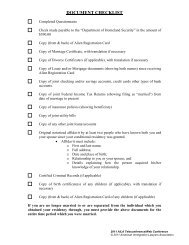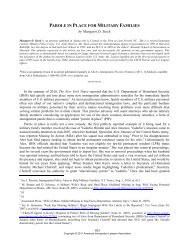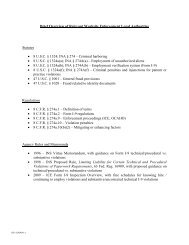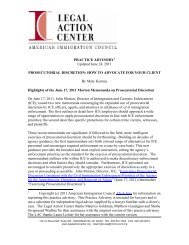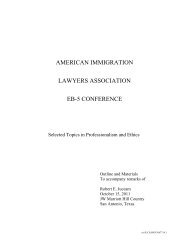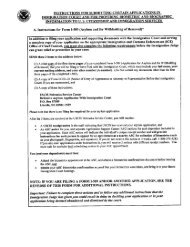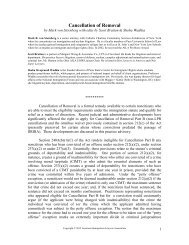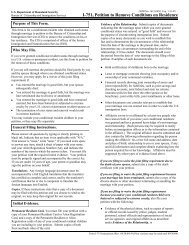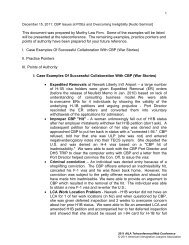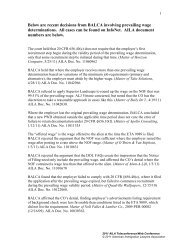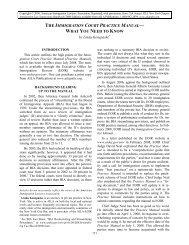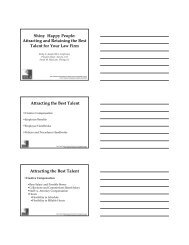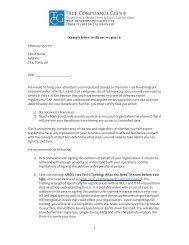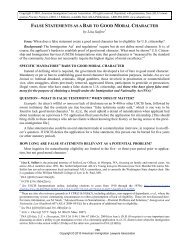Resources for 04-26-11 Seminar - AILA webCLE
Resources for 04-26-11 Seminar - AILA webCLE
Resources for 04-26-11 Seminar - AILA webCLE
Create successful ePaper yourself
Turn your PDF publications into a flip-book with our unique Google optimized e-Paper software.
WAC 07 277 53214Page 9Neither counsel nor the director noted that Congress has provided a statutory definition <strong>for</strong> the term"organization." Specifically, section 101(a)(28) ofthe Act, 8 U.S.C. § <strong>11</strong>01(a)(28), provides:The term "organization" means, but is not limited to, an organization, corporation, company,partnership, association, trust, foundation or fund; and includes a group of persons, whetheror not incorporated, permanently or temporarily associated together with joint action on anysubject or subjects.Given the broad statutory definition of "organization," including corporate persons that are associatedtogether with joint action on any subject, the AAO must conclude that the petitioner, is part of a largerqualifying organization, that is doing business as an employer in the United States and in at least oneother country.5Additionally, the L-1 regulations allow <strong>for</strong> the petitioner to avoid classification as a new office if it can showthat it has been doing business <strong>for</strong> at least one year through a related entity. Specifically, in the definition of"new office," the regulations refer to an "organization which has been doing business in the United Statesthrough a parent, branch, affiliate, or subsidiary." 8 C.F.R. § 214.2(l)(l)(ii)(F). (Emphasis added.) While thedirector asserts that the "parent, branch, affiliate, or subsidiary" must refer to the petitioning entity itself, sucha construction would render the definition redundant and meaningless. Accordingly, <strong>for</strong> purposes of the term"doing business" and the one-year new office period, the petitioner will not be considered a new office if it ispart of a larger "organization which has been doing business in the United States through a parent, branch,affiliate, or subsidiary" <strong>for</strong> one year or more. 6The AAO notes that the director improperly discounted counsel's observation that legacy Immigration andNaturalization Service (INS) intended the "doing business" requirement to be interpreted broadly. The legacyINS originally proposed the current definition of "dOIng business" in a 1986 Proposed Rule. 51 Fed. Reg18591 (May 21, 1986) ("'Doing business' means the regular, systematic and continuous provision of goodsand/or services by a qualifying organization and shall not include the mere presence of an agent or office ofthe qualifying organization in the United States or abroad."). Counsel noted that legacy INS received public5 As will be discussed, the petitioner failed to submit evidence relating to the beneficiary's assignment toand his ultimate employment on the Foods project. However, the record contains copies of Wageand Tax Register reports that were prepared by Automatic Data Processing, Inc. on behalf of and itsemployees. While questions remain regarding the nature of the beneficiary's ultimate assignment, thisevidence is facially sufficient to satisfy the narrow question whether the petitioner is doing business as anemployer within the United States, as required by 8 C.F.R. § 214.2(l)(l)(ii)(G)(2).6 However, as will be discussed in this decision, the petitioner may not rely on the larger corporateorganization to qualify <strong>for</strong> this nonimmigrant visa petition and then take cover behind the individualcorporation by stating that it cannot speak <strong>for</strong> or provide in<strong>for</strong>mation pertaining to the larger corporateorganization when the director requests material evidence that relates to the organization's business activities.While this may be the result of innocent mistake, the failure to answer questions about the organization as awhole could result in a denial. See 8 C.F.R. § 103.2(b)(14).



